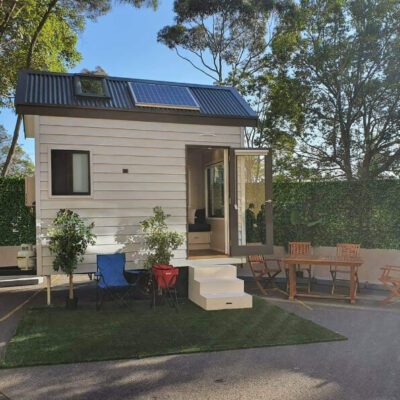The Tiny Office Space Revolution Is Here
Tiny houses are beautiful, low carbon, affordable expansions to your office space that are quick to build. Join us as we explore how companies around the world are benefiting from using tiny houses in their workplaces, and how you can too.
The bottom line matters, and for a company thinking of moving or expanding, tiny houses can offer a unique benefit. Money spent on the build is not tied to the location, meaning that when your company grows or wants to move premises, the space investment you have made is as mobile as your tiny house; it can be taken with you or sold. This can be a lifeline for smaller businesses and start-ups who chose their original work location in an ‘up and coming’ area which is becoming more expensive.
The cost of premises is a significant overhead. Tiny houses cost a fraction of what expanding into conventional office space would cost, meaning companies can make sure they are using their money where it has the highest impact, rather than on work space. For smaller and start-up businesses where every penny counts, tiny houses could present a uniquely well fitted solution.
What about larger companies who are considering downsizing? A 2020 KPMG survey found that 69% of CEO’s are rethinking or shrinking their real estate portfolios as the world transitions to what Forbes calls ‘hybrid working’; a splicing of at home and in office work. For these larger organisations who are looking to downsize their conventional office space, tiny houses again offer a flexible, bespoke alternative to the traditional office, allowing for modular components to be added and taken away as required.
International property firm Cushman and Wakefield predict that the offices of the future will no longer resemble rigid blocks of identical buildings where employees are obliged to report every day, but will become ecosystems that nurture the employee and offer personalised sites of innovation that foster creativity and emphasise well-being.
Interest in this type of agile working has already increased by 500% in some cities since early 2020. Beautiful, thoughtfully designed environments have been shown to exert a positive force on the well-being and productivity of the people in them, and with custom made tiny houses the power to create nourishing workplaces has never been easier or more affordable.
The flexibility and affordability of bespoke tiny homes has become particularly important during the pandemic, where innovative responses to disruption in the workplace has led to broad scale endorsement of the ‘hub and spoke’ model for work spaces; where one central office is surrounded by multiple smaller work spaces around the city. When these workspaces can be picked up and moved to new locations based on the changing needs of the company, the benefits can be significant.
But it’s not just a practical solution for a company with a budget, tiny houses also add intrigue and uniqueness to a brand identity.
In a 2017 article in Fast Company, Laurence Sarrazin of design company Coroloft stated “There is the aspect of expressing your values and identity through your environment. For start-ups, this is an important way to define themselves to clients, to investors, to employees and the public. For those that are lucky enough to be around long-term, the origin story of the enterprise is at the heart of their story often, and in those cases, the mobile office serves as a full-scale origin-myth totem—and one that is still functional.”
Combine these benefits with an environmentally friendly, concrete-free, low-carbon construction and the appeal becomes even clearer.
Get in touch at any time to talk to a member of our team about your needs, and join the tiny revolution.
This is the first of our guest writer series and a special ‘thanks’ must go to Alice Wilson who will be working with us on blogs and videography moving forward:
Alice Wilson is a PhD researcher at the University of York. She won an ESRC scholarship in 2018 to complete her thesis on the development of the tiny house movement in the UK. In 2020 she co-founded the social enterprise OpHouse which will bring the first tiny house self-build neighbourhood to the city of York. You can follow her research here at Tiny House Research


